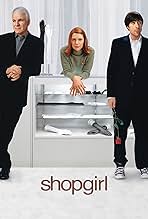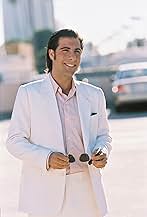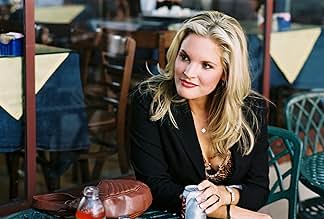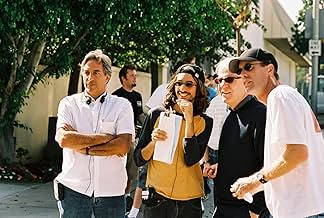Shopgirl
- 2005
- Tous publics
- 1h 46min
Ajouter une intrigue dans votre langueA film adaptation of Steve Martin's novel about a complex love triangle between a bored salesgirl, a wealthy businessman and an aimless young man.A film adaptation of Steve Martin's novel about a complex love triangle between a bored salesgirl, a wealthy businessman and an aimless young man.A film adaptation of Steve Martin's novel about a complex love triangle between a bored salesgirl, a wealthy businessman and an aimless young man.
- Réalisation
- Scénario
- Casting principal
- Récompenses
- 1 victoire et 7 nominations au total
- Hot Tears Band Member
- (as Johnny Fedevich)
Avis à la une
Claire Danes, who I wanted desperately to like, gives a catatonic performance as a lonely young woman looking for love, or at least human contact, in L.A. A love triangle of sorts develops between her, a wacky spaced-out nice guy (Jason Schwartzman) and an older, very well off divorcée (Steve Martin), who's nearly as catatonic as Danes. Absolutely nothing of significance or originality happens as this story builds toward a conclusion you can predict before the opening credits have even finished rolling. The characters played by Danes and Martin are such drips that you can't muster up one iota of interest in what happens to either of them or their love affair. The film moves at a woeful pace, and everything's set to a funereal, repetitive string score. The only life in the film comes from Schwartzman, who has far too small a role. In fact, why not just make a movie about him next time?
Grade: C-
The look and sound of the film are half of its appeal, from Peter Suschitzky's dreamy cinematography, to the production and art design that has each character in their own color scheme, to the enthralling score by Barrington Pheloung, though the atmospherics almost overwhelm the three characters who frequently seem like pieces in a set design as the camera slowly glides back to reveal an entire mise en scene.
Claire Danes is radiant and holds our eye and sympathy throughout the film, as we see life mostly from her first naive than wiser perspective, though she is portrayed as just about the last sweet young woman in the country, as all the other women seem pretty cold-blooded. While she has an underlying problem common to such in TV and movies these days, it is handled surprisingly visually and tenderly.
Over fourteen months, she encounters a bumbling young suitor, the adorably scruffy Jason Schwartzman, who even as his character matures retains endearing enthusiasm and quirks, and a sugar daddy in a somewhat mysterious Steve Martin, who is more believable than "Sex and the City"s similar "Mr Big." Ironically, the few physical comedy scenes are with Schwartzman, not Martin-- and that's a very funny scene about a condom, as this film in its quiet way is pretty frank about sex.
An occasional voice-over narration is obtrusive and unnecessary, even as Martin's adaptation of his novella claims the need for an omniscient observer, but the camera and the characters' body language visually communicate the same information. The sudden insertion of a parallel scene where two main characters suddenly explain themselves to listeners who we didn't know previously existed in their lives is a bit too convenient and doesn't really fit.
But the film is on the whole winning, as each character very gradually learns about who they are and who they can be, about the meaning of life, love, success and human connections, and about the clear-eyed choices they can make to attain these, to change or not. While the bulk of the film is set in Los Angeles, it feels like a picaresque journey of discovery as they go from one scene to another.
The song selections are marvelous, particularly Mark Kozelek's varied twists on different genres to reflect the different characters. It's a cute joke to have Schwartzman's "Jeremy" as a roadie when he has been on the road with Phantom Planet.
The costume design by Nancy Steiner is lovely; clearly the shopgirl was using all the discounts available to her at Saks even before a paternalistic benefactor picks up the tab.
While the insight into quiet desperation is always fascinating, Martin's script fails to really show any human connection between the three leads. Martin's own character, while easily the most privileged, is far and away the most distant and least interesting. The always interesting Claire Danes desperately wants to be loved and escape the ever-present cold existence of Vermont which continues to haunt her. Jason Schwartzman (fast cornering the market on quirky to the point of annoying dudes) is initially enamored with the idea of being with Claire (or anyone) but goes on the road with a rock band and finds himself ... or at least educates himself on how to fit into society.
Not sure if any of the characters have any real redeeming qualities, but they do make for moderately interesting film-making. Bridgette Wilson (Mrs. Pete Sampras) has a fluffy role as the envious make-up queen, Sam Bottoms makes a rare screen appearance as Danes say-little Dad and Francis Conroy (Beautiful Flowers, Six Feet Under) has a brief appearance as Daines Mom. Interesting side note is that Rebecca Pigeon has a small role ... she is the real life wife of the great David Mamet.
Although, the lighting is atrocious and distracting in most every scene, you do find yourself hoping that someone, ANYONE, discovers a moment of real happiness. Yes, this story could have been better presented, but it is worth watching to view first hand how people pretend to connect.
The main issue with the film is Anand Tucker's direction. Only his second feature film, following 1998's Hilary and Jackie, Shopgirl is played far too serious. A heavy camera seems to plod its way through scene after scene. Several moments, mostly those with Jason Schwartzman in them, try to lighten things; but even some fairly good laughs cannot remove the feeling that this isn't a very happy film.
It is perhaps unfair to blame Tucker for the mood entirely. Similar complaints were leveled against Martin's original novella. But how much more endearing, how much more fun, this film would've been under someone like Rob Reiner. It is, after all, a comedy of relationship errors. There is drama here but the heart and soul of the story is in the laughter. The mistake is entirely in playing it as a drama with comedy, not a dramatic comedy.
The other main flaw is the tedious, and essentially needless, voice-over narration. Whether in screenplay format the narration read fine, or if it was added later to clarify the film for mainstream audiences, it detract. The actors are all capable enough to express their emotions without explanation. It is not hard to tell when a young woman goes home to an empty apartment and a cat that she is lonely. As remarked by a man sitting behind me: "A movie loses something when it has to be explained." The problem with the narration here is that Shopgirl doesn't need to be explained, but is.
Not helping the dreary atmosphere is Barrington Pheloung's ridiculously over-dramatic score. Echoing the work of Alexandre Desplat, especially Girl With a Pearl Earring (produced by Tucker), Pheloung seems insistent upon forcing drama into every note. The music plays less as an underscore than as an upstaging diva. Other technical work reaches must loftier heights. Nancy Steiner's endearing costume design, a cross between her work on The Virgin Suicides and a Day/Hudson comedy, gives instant heart to the characters. Danes' Mirabelle benefits the most. Likewise the art direction, by Sue Chan and David Smith, is delightful. Danes' apartment has an apt Vermont-meets-L.A. feel whereas Martin's two homes are cold and hollow, like his character.
The curious thing is that when all the elements come together Shopgirl is an enjoyable experience. As it was playing I really liked it. But when all is said and done there is something missing. Once you stop laughing you realize it is a profoundly unhappy film. Despite the strong and endearing performances the film is simply too sad to win any hearts, but well-meaning enough not to send any away.
Le saviez-vous
- AnecdotesFor the scene in Mirabelle's bedroom where the cat jumps on the bed and watches her and Jeremy, there were actually two cats used. The director explains in his commentary that one could jump but never watched, and the other was good at watching but couldn't jump.
- GaffesThe card that Ray sends to Mirabelle reads "I would like to have dinner with you" in block print, with a signature at the bottom. When we see this card again at the very end of the movie, the signature has been replaced by "Ray Porter" in block print.
- Citations
Ray Porter: As Ray Porter watches Mirabelle walk away he feels a loss. How is it possible, he thinks, to miss a woman whom he kept at a distance so that when she was gone he would not miss her. Only then does he realize that wanting part of her and not all of her had hurt them both and how he cannot justify his actions except that... well... it was life.
- ConnexionsFeatured in Late Show with David Letterman: Épisode #13.53 (2005)
- Bandes originalesLily & Parrots
Written and Performed by Mark Kozelek
Published by God Forbid (BMI)
Courtesy of Jetset Records
Meilleurs choix
Détails
- Date de sortie
- Pays d’origine
- Langues
- Aussi connu sous le nom de
- 灰姑娘的愛情手套
- Lieux de tournage
- 2250 Apollo Dr., Los Angeles, Californie, États-Unis(Ray Porter's home.)
- Sociétés de production
- Voir plus de crédits d'entreprise sur IMDbPro
Box-office
- Budget
- 10 200 000 $US (estimé)
- Montant brut aux États-Unis et au Canada
- 10 284 523 $US
- Week-end de sortie aux États-Unis et au Canada
- 229 685 $US
- 23 oct. 2005
- Montant brut mondial
- 11 675 161 $US
- Durée
- 1h 46min(106 min)
- Couleur
- Mixage
- Rapport de forme
- 2.35 : 1









































